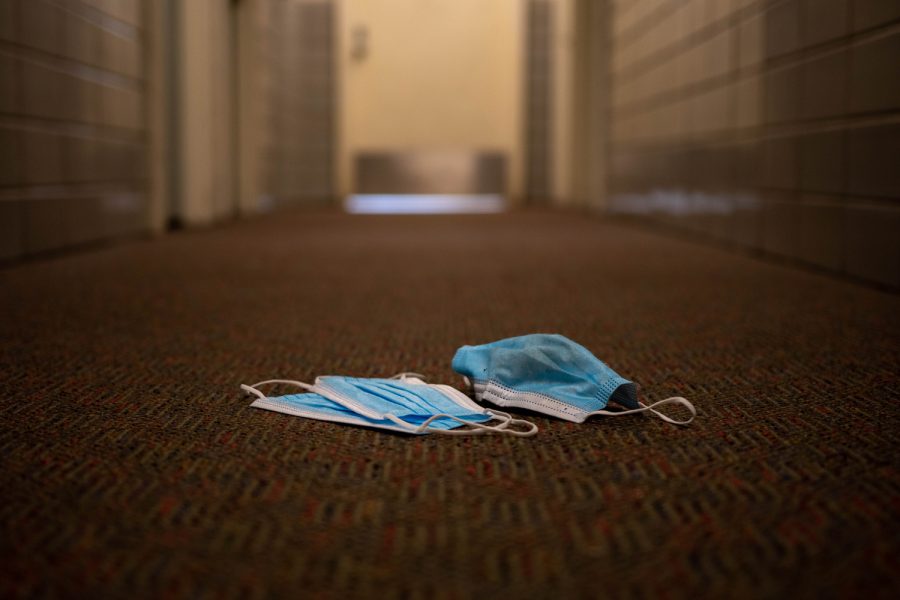Johnson County Public Health shifts COVID-19 mitigation perspective
The Johnson County Public Health director and community manager both said the announcement came as no surprise, and thanked the Johnson County community for cooperating with them during the pandemic.
Photo illustration by Johnny Jarnagin
February 28, 2023
Johnson County Public Health officials say they are not surprised after the state announced Feb. 23 that it will end mandatory reporting for COVID-19 next month.
The Iowa Department of Health and Human Services said it will no longer require counties to report positive COVID-19 tests — something it has done since March 2020 — to the Public Health Division, effective April 1.
Over 10,000 Iowans have died due to COVID-19, according to The New York Times.
Sam Jarvis, Johnson County Public Health community health division manager, said the change to reporting has been at the top of public officials’ minds for a long time now.
“The federal administration had mentioned that they would provide 60 days notice and begin to signal when that would be and what that would look like for all of us,” Jarvis said. “And so, I imagine for the last couple of weeks, two months, a lot of us have been kind of wondering what those details look like.”
The department said the type of COVID-19 reporting no longer reflects the prevalence of the virus in Iowa.
The University of Iowa ended online self-reporting on Aug. 1, 2022, and the county public health department ended contact tracing and case investigation on Jan. 4, 2022.
Johnson County Public Health Director Danielle Pettit-Majewski said even though the county public health department knew the announcement was coming, it was still difficult to believe after having combated the pandemic for the past three years.
“It’s so hard, I think, to acknowledge, especially when so much of your time and your work over the last three years has been so involved with COVID response,” she said. “And so, kind of having it come to an end, it’s a little jarring. But also at the same time, It’s a relief in other ways.”
Pettit-Majewski said the county is now moving into a new phase of life where COVID-19 will be endemic, which she said would require an adjustment. According to the Centers for Disease Control and Prevention, endemic refers to a disease with a constant presence in a community.
Jarvis said it was too early to say if it is the right time for the state to scale back its COVID-19 response.
“I think what would be best to focus on is what is still going to be in place, which a lot of items it sounds like will be — and we’re happy to hear that,” Jarvis said. “Our biggest concerns, from our perspective … is really where and how vaccines and therapeutics will be handled going forward.”
For the Johnson County Public Health department, Pettit-Majewski said it would continue to provide the best service it could for the community and provide whatever resources it could.
Pettit-Majewski and Jarvis both said they were thankful to the community for their cooperation with county public health, citing the relationship as a key factor for keeping the county safe.
“Johnson County has the highest vaccination rate in the state, and that doesn’t happen by accident,” Pettit-Majewski said. “I can’t thank them enough for listening to guidance, for masking, for doing all of the things that saved lives over the past three years.”
Johnson County Public Health Director Danielle Pettit-Majewski said even though the county public health department knew the announcement was coming, it was still difficult to believe after having combated the pandemic for the past three years.
“It’s so hard, I think, to acknowledge, especially when so much of your time and your work over the last three years has been so involved with COVID response,” she said. “And so, kind of having it come to an end, it’s a little jarring. But also at the same time, It’s a relief in other ways.”
Pettit-Majewski said the county is now moving into a new phase of life where COVID-19 will be endemic, which she said would require an adjustment. According to the Centers for Disease Control and Prevention, endemic refers to a disease with a constant presence in a community.
Jarvis said it was too early to say if it is the right time for the state to scale back its COVID-19 response.
“I think what would be best to focus on is what is still going to be in place, which a lot of items it sounds like will be — and we’re happy to hear that,” Jarvis said. “Our biggest concerns, from our perspective … is really where and how vaccines and therapeutics will be handled going forward.”
For the Johnson County Public Health department, Pettit-Majewski said it would continue to provide the best service it could for the community and provide whatever resources it could.
Pettit-Majewski and Jarvis both said they were thankful to the community for their cooperation with county public health, citing the relationship as a key factor for keeping the county safe.
“Johnson County has the highest vaccination rate in the state, and that doesn’t happen by accident,” Pettit-Majewski said. “I can’t thank them enough for listening to guidance, for masking, for doing all of the things that saved lives over the past three years.”




